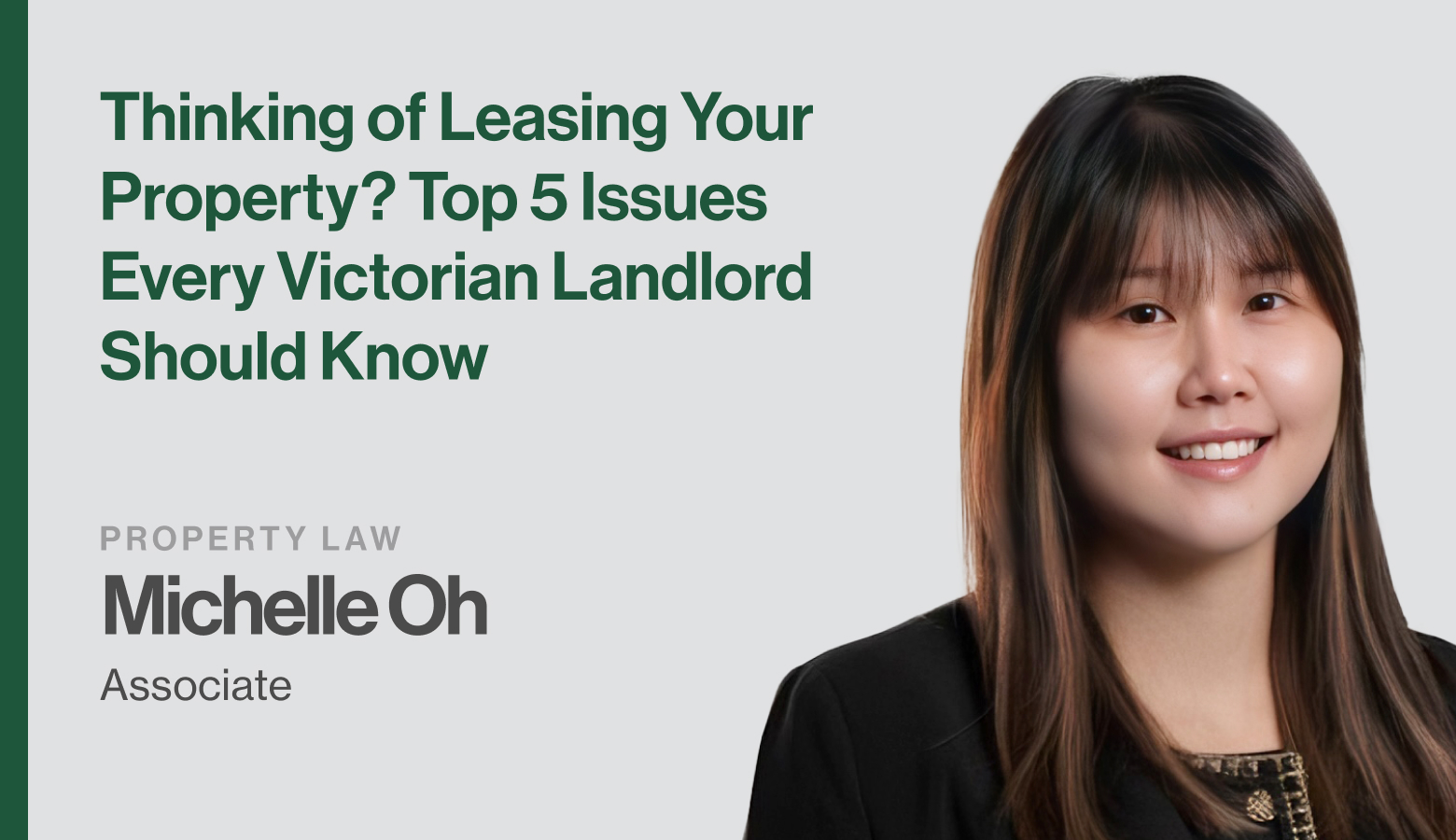
Introduction
Leasing out your commercial or retail property can be a great source of steady income, but it also comes with legal obligations and financial risks. Many landlords assume the lease is straightforward, especially if they have used one before. But each property and tenant is different, and getting a few key things wrong at the start can lead to costly problems later.
Our Top 5
Here are the five common issues landlords in Victoria should be aware of before locking in a lease.
1. Determine whether the lease falls under the Retail Leases Act 2003 (Vic)
Not all commercial leases are the same. In Victoria, some leases fall under the Retail Leases Act 2003 (Vic)(‘the Act’), which brings extra rules for landlords and rights for tenants. For example, you may need to provide a Disclosure Statement, you might be restricted from charging land tax, and there are specific rules around things like maintenance and ending the lease. Whether the Act applies depends on how the property is used, not whatthe lease is called, and you cannot contract out of it.
Why this matters: Misclassifying a lease can lead to non-compliance, unenforceable terms, and disputes. You might unknowingly breach your legal obligations or lose the ability to enforce part of the lease later. It is much harder and more expensive to fix this after a dispute has started.
2. Outgoings must be properly disclosed
Outgoings are the regular costs involved in running and maintaining the property, such as council rates, building insurance, water charges, management fees, and owners corporation fees. If your lease falls under the Act, you need to give the tenant a written estimate of these costs before the lease is signed. Even if it doesn’t, it is still important to be clear about who is responsible for which costs.
Why this matters: If the lease is unclear on the outgoings, or you fail to disclose something, you could end up covering those costs yourself, even if you expected the tenant to pay. Disputes over outgoings are one of the most common sources of conflict between landlords and tenants.
3. Repairs and maintenance are not always the tenant’s job
Many landlords include a clause requiring the tenant to handle repairs and maintenance. But if the Act applies, there are certain responsibilities that remain with the landlord, regardless of what the lease says. This typically includes structural repairs and ensuring essential services, such as air conditioning and fire safety systems are properly maintained.
Why this matters: Even if your lease states that the tenant is responsible for certain repairs, the legislation may impose obligations on the landlord regardless. If an issue with the building is not properly addressed, you could be held liable, or even found in breach of the lease yourself.
4. Pay close attention to options and renewal terms
If you are offering the tenant an option to renew the lease, it is important to be clear about how and when that option can be exercised. The lease should spell out how much notice the tenant must give, the form the notice must take and whether any conditions apply (such as not being in breach). It is also important to understand whether the tenant has a legal right to renew under the Act, even if the initial lease term is less than five years.
Why this matters: Disputes often arise when a tenant misses a deadline or thinks they have more rights than they do. If the option process is not clear, you might end up in a legal standoff, with one party wanting to renew and the other trying to move on. On the flip side, if you do not include an option but intend to keep the tenant long term, you could find yourself with a vacancy you did not expect. Getting this right ensures you stay in control of your property and avoid unintended commitments.
5. Ending a lease requires the right process
If a tenant stops paying rent or breaches the lease, you cannot simply change the locks or remove their property. There are strict legal steps that must be followed, including serving a written notice under section 146 of the Property Law Act, which gives the tenant an opportunity to remedy the breach before any further action can be taken.
Why this matters: Failing to follow the correct legal process can leave you exposed, even a valid lease termination may be challenged. You may risk claims of unlawful eviction, financial loss, or be unable to recover unpaid rent.
A lease is more than just a formality. It sets the rules for how your property will be used and managed over the lease terms. Taking the time to get it right at the start, can help you avoid costly problems later. Understanding these five issues can help you avoid common mistake, and you will be in a stronger position to protect your interests as a landlord.
How Sharrock Pitman Legal can assist you
As Accredited Specialists in Property Law, our team has the runs on the board when it comes to advising commercial and retail landlords on leasing as well as property acquisition and resolving lease disputes.
Please do not hesitate to contact us on 1300 205 506 or email sp@sharrockpitman.com.au.
The information contained in this article is intended to be of a general nature only and should not be relied upon as legal advice. Any legal matters should be discussed specifically with one of our lawyers.
Liability limited by a scheme approved under Professional Standards Legislation.
Michelle Oh is an Associate in our Property Law Team. Please contact Michelle Oh directly on (03) 8561 3311 or email michelle@sharrockpitman.com.au.








_th-1339574840.jpg)
